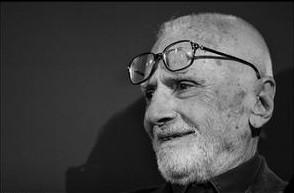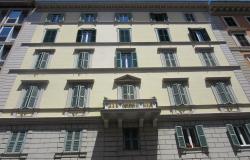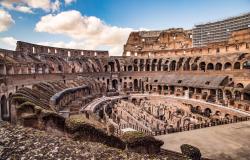Film director and screenwriter Mario Monicelli died at the age of 95 yesterday after jumping from a fifth-floor hospital window in Rome. He had been admitted several days earlier and was being treated for prostrate cancer.
Mario Monicelli was born in Viareggio [Tuscany] in 1915. After studying history and philosophy at the University of Pisa, he entered the world of cinema through his friendship with Giacomo Forzano, whose playwright father had helped set up film studios in Tirrenia. Monicelli made his first short film in 1932 in partnership with Alberto Mondadori. His first feature-length film was “Pioggia d’Estate” [“Summer Rain”] in 1937. Between 1939 and 1942 Monicelli wrote over 40 screenplays.
From the 1940s onwards he made many comedies and is generally regarded as the “father of Italian film comedy” [“commedia all’italiana”]. In 1948, with Steno [Stefano Vanzina] he directed the great comic Totò in “Totò cerca casa” [“Toto Looks for a House”] and several other Totò films followed.
Working independently from 1953, Monicelli directed many of the great names of Italian cinema: Marcello Mastroianni, Sophia Loren, Vittorio Gassman, Vittorio De Sica, Anna Magnani, Monica Vitti and Gian Maria Volonté all featured in his films, which treated diverse subject matter.
Among Mario Monicelli’s best known films are: “I Soliti Ignoti” [“Big Deal on Madonna Street”, 1958]; “La Grande Guerra” [“The Great War”, 1959]; "I Compagni” [“The Organizer”, 1963] ; “Casanova 70” [1965] and “Amici Miei” [“My Friends”, 1975].
In 1959, “La Grande Guerra” won the Golden Lion Award at the Venice Film Festival, where years later, in 1991, Monicelli received a Lifetime Achievement Award . “I Compagni” and “Casanova 70”, along with the director’s 1968 film, “The Girl with the Pistol” were nominated for Oscars. “Amici Miei” was a huge success in Italy and many of the scenes were based on incidents which happened during Monicelli’s youth. Monicelli’s last film, made when he was 91, was “Le Rose del Deserto” [“Roses of the Desert”].
In his last months, Mario Monicelli lent his voice to protests against cuts in arts funding in Italy, encouraged young Italians to protest against government policy in order to secure their future and criticised Italian cinema for the way in which it portrays Italy today.
Tributes have been pouring in since his death was announced and the director Giovanni Veronese said, “Monicelli was my Fellini”. Politician, writer and former Mayor of Rome Walter Veltroni said that Mario Monicelli was an extraordinary man who carried his 95 years with a strong sense of irony. Mr Veltroni said that the director had become the “grand old man” of Italian cinema against his will. Speaking of Monicelli’s suicide, the actor and director Michele Placido said that we should respect his decision.
Family members have announced that there will be no funeral but a farewell ceremony will be held in the Rione Monti, the district of Rome where the director lived.











